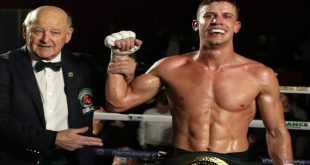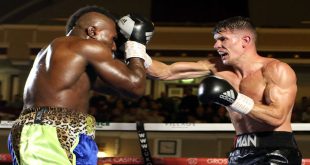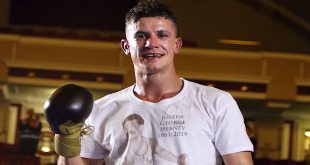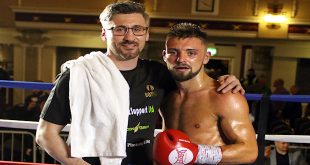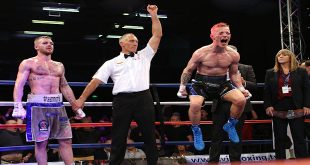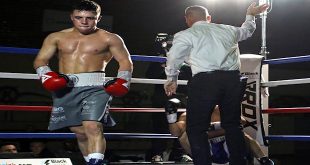Saturday, November 15 saw David Haye embark on his heavyweight quest. Across the Irish Sea, a slighter gladiator was treading water, with the prospect of a super bantamweight world title lying somewhere over the horizon.
Bernard Dunne carried out his training camp in preparation for the rugged Eduardo Garcia. Garcia was indisposed a few weeks before the fight and in his place, Cristian Faccio assumed the antagonist’s role in opposition of the Irish folk hero.
Faccio was well regarded, ranked eleventh by both WBO and WBC sanctioning bodies. Faccio, however, is naturally a bantamweight and on the day of the weigh-in, was a pound below the limit and indeed below Dunne, who weighed one hundred and twenty two pounds precisely.
Dunne’s interview revealed him to be supremely confident and thoroughly prepared for this fight, which he believes will provide him access to the upper echelons of world boxing.
Faccio’s modest entrance was given a fine Irish welcome. He was far from home, but was awarded a warm applause. Had he been the second man to enter the ring he would have had no reason to be intimidated, but as he moved about in his corner, Dunne’s entrance transformed the Breaffy Arena into a cauldron and one had to imagine Faccio, far from home standing in the centre of an Irish coliseum.
First pitched into darkness, the arena was filled with theatrical smoke, spotlights and the battle cries of the Irish fans, which added to the dramatic overstatement that is Dunne’s entrance.
With a prelude from the Ofortuna theme, Dunne burst from the tunnel as “The Irish Rover” echoed through the audience. Having weighed in a pound below his opponent at 121, Faccio looked to be of an equal size with Dunne, although Dunne availed of an inch or so in a height advantage and one would imagine in reach.
Faccio kept warm, shadowboxing in his corner. This act told its own story; throwing all hooks and uppercuts, it was immediately apparent Faccio would be a stereotypical South American inside fighter. Awaiting the bell, Dunne looked tigerish.
Despite the intent that was shown on both men’s faces, the opening round was easily summarised as “cagey.” Dunne seemed contented to take a look at his opponent, an objective that was made difficult as the seemingly intimidated Faccio took few risks in an uneventful round.
In fact the only telling information that could be extracted from the first frame was Faccio’s problem with balance. A slightly looping jab caused the uninjured Faccio to fumble for his feet and was enough to award Dunne the round.
There was no dramatic turnaround in the second. Dunne showed some educated movement, eluding Faccio’s occasional shots. It was immediately apparent that Dunne was a superior boxer as he again exploited his opponent’s deficiency in terms of balance and staggered him again with a left.
The opening of the third saw Dunne employ the jab to great effect, his quicker left negating the infrequent aggressive advances by Faccio. A quiet round was treated to gracious applause despite the lack of action. It seemed at times the crowd were determined to enjoy themselves, despite the one sided nature of the fight.
The fourth session saw Dunne accelerate, increasing the tempo with combinations. Dunne never attacked without abandon, self preservation was always in the back of his mind as he skipped away from Faccio’s vain attempts at offense.
One would assume that it was the effectiveness of Dunne’s defence that allowed him such dominance, but at ringside many remarked that it was in fact the ineffectiveness of Facio’s attack.
He circled constantly, attempting to slip the Irishman’s swift left hands, this rhythm interrupted only occasionally when he hunched low, winging right hooks that one assumes were directed at Dunne’s body, although one could not confirm this as he landed only occasionally in the early going.
As the bell for the fifth round sounded, the fight adopted a new tone. Although still outclassed and being picked off, Faccio became more assertive, a sense of urgency entered his movements and most notably, his earlier balance issues seemed to have been cast aside.
Despite this transformation, Dunne was still the fighter to punctuate the round, with a crisp left hook drawing an enthusiastic cry from his audience.
The fight passed its midpoint with the dawn of the sixth round, but it may as well have been a separate fight. Faccio left the corner with intent. He had cast aside his attempts at slipping, opting instead to throw up his gloves to protect his face from Dunne’s speedy assault.
This more vertical stance served Faccio well as he began to connect more frequently with Dunne’s head and this bore dramatic consequences.
Perhaps it was due to the confidence he had built in the first five rounds, perhaps his legs tired a little from his perpetual retreat or perhaps it was simply luck, but midway through the round, Dunne was caught.
Faccio connected with a left hook and straight that shook Dunne. His visage became slightly reminiscent of the night he was annihilated by Kiko Martinez and Dunne’s legs quivered. Faccio pounced, bounding forward attempting to catch Dunne with numerous hooks, but was smothered by Dunne as he held.
Broken apart by referee Emille Tiedt, Dunne let a pantomime shrug, another characteristic we had seen in the Martinez fight. The Uruguayan furiously pursued his man, he sensed the finish and it is not an exaggeration to say that Dunne was thankful to hear the bell.
Faccio was on his feet with ten seconds left until the dawn of the seventh round. Granted permission by the bell, Faccio tore across the ring, seeking to carry out the game plan that had presented itself to him in the previous round.
Dune did rather well with the jab in this round and smothered when Faccio aggressively bundled to close quarters. It was in one such instance the fight reached its dramatic climax. Dunne seeking to smother, Faccio seeking to impose himself inside, moved together at once, clashing foreheads in the process.
Although Faccio turned to complain and seek a break, instantaneously it was apparent Dunne had seen the worst of the clash. A column of blood poured from a broad wound that was located high on Dunne’s forehead. A boxing enthusiast since my early childhood, having followed Hatton, Gatti and Vasquez religiously, it is quite the statement to say this was the worst cut I have ever seen.
I was reminded of Henry Copper in his famed loss to the young Muhammad Ali in terms of volume of blood, but was certain that the actual wound was more severe. With the blood wiped once, Dunne bravely continued the round.
Faccio, inspired by the sight of blood, suddenly became a very dangerous opponent. Early on, he had been completely focused with the body, but at this point, Dunne’s forehead became the bull’s-eye.
Dunne was hurt once more in this round, but survived rather well, despite his obviously impeded vision. A dramatic round undoubtedly, but it was the work in the corner that drew most speculation and controversy.
Dunne’s corner was a bee hive of panicked conversation and activity. His traditional cornermen were joined by the Doctor and the omnipresent Brian Peters, Dunne’s promoter.
Decisively, the Master of Ceremonies, Mike Goodhall, joined the congregation in Dunne’s corner. It became apparent that the fight was over, the only mystery was ascertaining the result.
The bell rang to signal the eighth round. Faccio was on his feet, waiting for Dunne to arise. Nearly a full minute of confusion followed before Goodhall entered the ring to audible displeasure from the crowd.
Goodhall explained that since Dunne was deemed unfit to continue, the fight would be stopped and decided on the scorecards. This left Dunne the decisive victor, but only bore fruit to more controversy. Those at ringside disputed that the doctor had left the corner first and it seemed to be Dunne himself that shook his head finishing the fight.
Later video evidence seemed to support this claim. In an interview in the ring, Dunne claimed he could not see for the duration of the last round and he felt aggravated that Faccio was beaten in such a manner. A sense of bewilderment was voiced among spectators as the arena was quickly vacated.
Dunne has the unique ability to leave the impartial spectator frustrated with a win. In the opening half of the bout, Dunne could have been described as a matador had Faccio not been more bull nosed than bullish.
In the later stages, Dunne was shaken badly, visibly hurt and in the opinion of many, there for the taking. The conclusion was also curious, it did seem that the corner decided against furthering the damage to their man.
For me, the fight did help me draw some conclusions: Dunne will never be capable of beating any of the top names. Juan Manuel Marquez, Celestino Caballero, Steve Molitor and “El Magnifico”, Israel Vasquez are all out of range.
Those are experienced fighters that can box with both tenacity and skill. I’m afraid Dunne just doesn’t have the physical makeup to withstand what those men can administer.
However, that is not a suggestion to stop watching Dunne. As long a this guy fights, there is drama and excitement. He will go down again, but Dunne will provide entertainment for all until then.
 Boxing News Boxing News
Boxing News Boxing News
